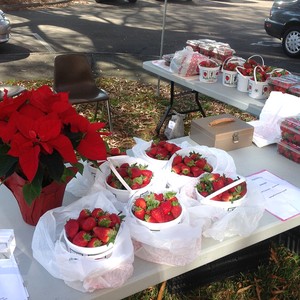Many residents of Raleigh, North Carolina, will be offering their guests fresh strawberries while entertaining family and friends this holiday season. But their guests may be surprised to learn the fruit they are enjoying was actually grown outdoors—in North Carolina.
The homegrown strawberries are part of an early-December fundraising project by Hudson Memorial Presbyterian Church in Raleigh. The $2,000 raised will support scholarships for Yei Teacher Training College in South Sudan.
Of course, if you are going to sell strawberries in December, it helps to have one of the nation’s leading strawberry experts as a member of your congregation. The man behind the project is Barclay Poling, professor emeritus at North Carolina State University, who is a member of Hudson’s global missions committee. He said these strawberries might be among the most flavorful because strawberries are, after all, a cool weather crop. Although he retired from teaching in 2013 he stays involved in research related to crop season extension potential in North Carolina.
“Strawberries are able to do something called ‘super-cooling’ at this time of year which is very beneficial,” said Poling. “The one thing we do that is quite different in this off-season production method is use a variety called Albion which is a day-neutral type of strawberry as opposed to our standard short day types. By the end of November and early December, the Albion is able to produce quite a bit of fruit.”
The fundraising effort helps Hudson fund its commitment to education in South Sudan through the Dolby/Underwood Scholarship program. The church currently covers tuition and living expenses for three students. One of these students, Kharibino Mayom, will soon graduate and begin teaching at Maleng-agok Primary School, a school Hudson has supported for many years.
Decades of civil war destroyed much of South Sudan’s infrastructure, including its educational system. Reports say the ratio of qualified teachers to students is 100:1. More than one million primary-aged children are not enrolled in school and UNESCO says that a girl in South Sudan is three times more likely to die in childbirth than complete a primary school education.

Strawberries grown by Hudson Memorial Presbyterian Church in Raleigh, North Carolina, to support scholarships at Yei Teacher Training College in South Sudan. —Photo provided
Hudson Memorial, and many other Presbyterian churches, have worked to help the people of South Sudan overcome poverty and violence through education. They chose to partner with Presbyterian World Mission to make the most impact with the $5,600 per year it costs to sponsor each student.
The Presbyterian Church (U.S.A.) has been active in Sudan for more than a century and has longstanding relationships with two partner churches, the Sudan Presbyterian Evangelical Church (SPEC) and the Presbyterian Church of South Sudan (PCOSS), which was the primary Presbyterian denomination serving Sudan.
The South Sudan Education and Peace Building Project is a joint effort between World Mission and its partners to provide access to quality education for all children and train leaders to be agents of peace and reconciliation throughout the country.
Funds raised through this project help develop community support and management of Presbyterian schools in at least 17 communities. World Mission joins communities’ efforts to build and repair schools. Mission co-workers Leisa Wagstaff and Lynn and Sharon Kandel are working with the Presbyterian Church of South Sudan Education Department to implement this program. Nancy Smith-Mather serves as the coordinator of the project and Shelvis Smith-Mather serves as principal of the RECONCILE Peace Institute (RPI).
RECONCILE (Resource Centre for Civil Leadership) was created in March 2004 by the New Sudan Council of Churches. Its purpose is “peace building” through training in trauma recovery, conflict transformation, and civic education. RPI students live and study in a diverse learning environment, which provides opportunities to spend time dialoguing inside and outside the classroom with students of different genders, ethnic groups, ages, socioeconomic status and life experience. The students also participate in fieldwork that allows them to practice their skills in the community and learn from organizations and churches based in Yei.
-----
To learn more about the South Sudan Education and Peace Building Project,” or to donate, click on https://www.presbyterianmission.org/donate/E052172-1/.

